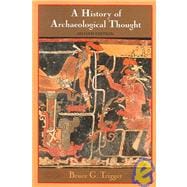
Note: Supplemental materials are not guaranteed with Rental or Used book purchases.
Purchase Benefits
What is included with this book?
| LIST OF ILLUSTRATIONS | xi | ||||
| PREFACE TO THE SECOND EDITION | xv | ||||
| 1 Studying the History of Archaeology | |||||
|
5 | (12) | |||
|
17 | (9) | |||
|
26 | (12) | |||
|
38 | (2) | |||
| 2 Classical and Other Text-Based Archaeologies | 40 | (40) | |||
|
40 | (8) | |||
|
48 | (4) | |||
|
52 | (15) | |||
|
|||||
|
67 | (7) | |||
|
74 | (3) | |||
|
77 | (3) | |||
| 3 Antiquarianism without Texts | 80 | (41) | |||
|
81 | (11) | |||
|
92 | (5) | |||
|
97 | (9) | |||
|
106 | (4) | |||
|
110 | (4) | |||
|
114 | (4) | |||
|
118 | (3) | |||
| 4 The Beginnings of Prehistoric Archaeology | 121 | (45) | |||
|
121 | (8) | |||
|
129 | (9) | |||
|
138 | (9) | |||
|
147 | (9) | |||
|
156 | (2) | |||
|
158 | (6) | |||
|
164 | (2) | |||
| 5 Evolutionary Archaeology | 166 | (45) | |||
|
167 | (4) | |||
|
171 | (6) | |||
|
177 | (12) | |||
|
189 | (4) | |||
|
193 | (2) | |||
|
195 | (12) | |||
|
207 | (4) | |||
| 6 Culture-Historical Archaeology | 211 | (103) | |||
|
211 | (6) | |||
|
217 | (6) | |||
|
223 | (9) | |||
|
232 | (3) | |||
|
235 | (6) | |||
|
241 | (7) | |||
|
248 | (13) | |||
|
261 | (17) | |||
|
278 | (12) | |||
|
290 | (13) | |||
|
303 | (8) | |||
|
311 | (3) | |||
| 7 Early Functional-Processual Archaeology | 314 | (72) | |||
|
315 | (4) | |||
|
319 | (3) | |||
|
322 | (4) | |||
|
326 | (18) | |||
|
344 | (9) | |||
|
353 | (8) | |||
|
361 | (6) | |||
|
367 | (5) | |||
|
372 | (10) | |||
|
382 | (2) | |||
|
384 | (2) | |||
| 8 Processualism and Postprocessualism | 386 | (98) | |||
|
386 | (6) | |||
|
392 | (26) | |||
|
418 | (26) | |||
|
444 | (34) | |||
|
478 | (2) | |||
|
480 | (4) | |||
| 9 Pragmatic Synthesis | 484 | (45) | |||
|
485 | (12) | |||
|
497 | (11) | |||
|
508 | (11) | |||
|
519 | (10) | |||
| 10 The Relevance of Archaeology | 529 | (20) | |||
|
529 | (3) | |||
|
532 | (6) | |||
|
538 | (2) | |||
|
540 | (9) | |||
| BIBLIOGRAPHICAL ESSAY | 549 | (34) | |||
| REFERENCES | 583 | (98) | |||
| INDEX | 681 |
The New copy of this book will include any supplemental materials advertised. Please check the title of the book to determine if it should include any access cards, study guides, lab manuals, CDs, etc.
The Used, Rental and eBook copies of this book are not guaranteed to include any supplemental materials. Typically, only the book itself is included. This is true even if the title states it includes any access cards, study guides, lab manuals, CDs, etc.